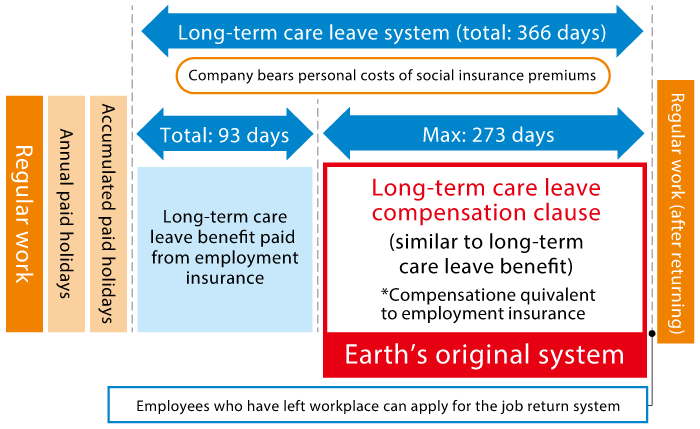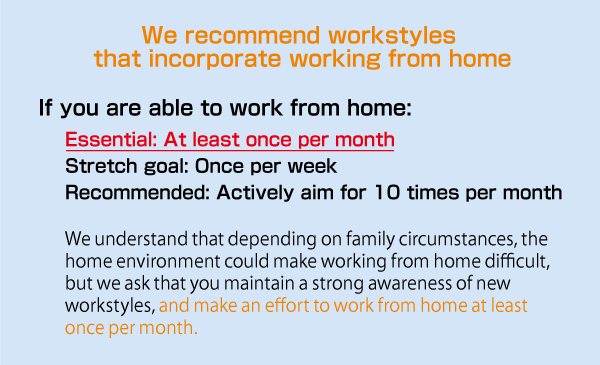Initiatives on diversity & inclusion
Promoting diversity & inclusion
The Earth Group Global Conduct Guidelines prohibit human rights violations and stipulate the acceptance of diversity (individuality and the demonstration of autonomy). They embody the rules that all Earth Group directors and employees must follow when undertaking business activities in countries with different lifestyles, customs, cultures, laws, and regulations.
Based on the value of “people are everything,” which is shared by all employees, we promote the creation of satisfying workplaces where employees respect the human rights and diversity of their colleagues, and the skills and experiences of each individual, through mutual recognition, assistance, and improvement. Diversity includes differences in birthplace, culture, age, experience, preferences, sexual orientation, and sexual identity, as well as differences in each life stage.
Promoting employment of persons with disabilities

Miyazaki Farm
By introducing barrier-free facilities and devices that can be used by persons with disabilities at plants, the R&D center, and other locations, and creating workplace environments where anyone can work easily, we have made it possible for employees to demonstrate their full potential in their own fields of specialization. At the Ako Plant and the Sakoshi Plant, both located in Ako City, Hyogo Prefecture, we outsource some production operations to a local facility for persons with disabilities, to support these individuals’ desire to work. We have also leased farmland in Miyazaki to provide disabled persons with a place to work, from the perspective of regional revitalization, in terms of creating employment opportunities in regions with few workplaces. Earth Corporation complies with the statutory requirement of 2.54% as the employment rate for persons with disabilities.
Promoting further participation by female employees
About 40% of Earth Corporation’s employees are women. We are working to put in place an environment where anyone can work in comfort, and where women can continue working with a high level of motivation even amid changes in life stages. As a company that handles household products, we also appoint women to research and brand management positions, to effectively apply women’s’ opinions in product development. Earth Corporation will continue to conduct initiatives aimed at achieving a ratio of 30% for women in management positions, including career training for managerial candidates and encouraging an awareness of autonomous career formation using career planning sheets.
Database of companies promoting participation by women: Corporate information (mhlw.go.jp)
Number and ratio of women in managerial or equivalent positions
| 2016 | 2017 | 2018 | 2019 | 2020 | 2021 | |
|---|---|---|---|---|---|---|
| Number of women in managerial or equivalent positions | 14 | 15 | 16 | 19 | 21 | 28 |
| Ratio of women | 5.4% | 4.9% | 5.3% | 6.4% | 7.1% | 9.2% |
| Number of women in assistant manager or equivalent positions | 35 | 40 | 48 | 44 | 51 | 59 |
| Ratio of women | 17.0% | 17.7% | 19.9% | 20.7% | 24.5% | 26.1% |
Ministry of Health, Labour and Welfare: Database of companies promoting participation by women
LGBT initiatives
With regard to LGBT issues as well, as one important aspect of diversity, in 2021, we conducted e-learning focusing on basic information regarding LGBT and Sexual Orientation and Gender Identity (SOGI). In 2022, we put in place in-house regulations and began applying the HR and employee benefit program to same-sex partners as well. At the same time, we conducted seminars, inviting instructors from outside of the company, to promote correct knowledge and understanding of LGBT issues. We have also established a new consultation liaison related to LGBT matters.
Promoting work-life balance
Earth Corporation has put in place a variety of systems so that employees can take the time they need to maintain a balance between work and child-rearing, caring for elderly relatives, and recovery from injury or illness. These include short working hours and flextime systems that can be set in 10-minute increments, and special family life support leave that enables each employee to take up to five days off per year for reasons including pregnancy, childbirth, caring for sick children, infertility treatment, menstrual leave, menopausal syndrome, illnesses recognized by the company, and caring for elderly relatives.
Supporting a balance of work and child-rearing
Based on a recognition of initiatives included in the fifth action plan (from April 1, 2018, to December 31, 2020), on May 14, 2021, the company received its third "Kurumin Certification” from the Tokyo Labour Bureau of the Ministry of Health, Labour and Welfare. “Kurumin Certification” is offered by the Minister of Health, Labour and Welfare to companies that have created and fulfilled general business action plans based on the Act on Advancement of Measures to Support Raising Next Generation Children, and which have also met specified standards.
![[Adoption and use of childcare system]](/en/sustainability/materiality-human-capital/activity-diversity-equity-inclusion/images/02.jpg)
Ratio of childcare leave used in 2021: Women: 100%; men: 36.7%
Number of employees who used childcare work systems in 2021: Short working hours: 32 (32 women, 0 men); flextime: 2 (1 woman, 1 man)
Number of employees who used the complete work-from-home system in 2021: 3 (3 women, 0 men)
Supporting a balance of work and caring for elderly relatives
To prevent employees from leaving the company due to long-term care responsibilities, we have further expanded systems for supporting these employees; for example, in 2019, we expanded the leave period to 366 days, shifted the burden of social insurance premiums during leave from the employee to the company, and established new accumulated paid holiday and job return systems that can be applied in the case of long-term care. In 2020, Earth Corporation joined a group insurance program that enables employees to receive income compensation while on leave. We registered these measures for balancing work and caring for elderly relatives with the Ministry of Health, Labour and Welfare’s “Work/Life Balance Support Square,” and we are now authorized to use the “Tomonin” mark that designates certified companies.


Job return system
In 2019, we introduced a system to enable employees to return to work after leaving the company for a variety of reasons, including marriage, pregnancy, childbirth, child-rearing, infertility treatments, change in spouse’s employment, caring for relatives, unavoidable injury or illness, or change of employment/studies for career improvement.
Sabbatical leave system
In 2022, we introduced a system that enables employees who have worked with the company for 10 years or more to take a leave of up to one year, regardless of the reason.
Workstyle reform initiatives

To achieve flexible work styles, following verification based on trials, we formally introduced a work-from-home system in September 2019 and a flextime system in January 2020. When these systems were first introduced, there were both objections and support for working from home and changeable working hours, and few employees made use of either system. To prevent the spread of coronavirus infections, however, the company encouraged employees to work from home or to use flexible working hours as much as possible, and almost all employees responsible for duties that could be executed at home had the opportunity to experience this workstyle. Since 2021, we have continued to implement new work styles so that employees themselves can work more autonomously; for example, the work-from-home system was expanded to include a broader range of duties, and employees can also apply flexible work hours while working from home.
Initiatives to promote appropriate work time and the use of time off

Beginning in January 2021, regular workdays, which had comprised 7.5 hours at the head office and branches and 8 hours at plants and the R&D center, were defined as 7.5 hours at all Earth Corporation workplaces. “No overtime day,” which began as a monthly occurrence in 2017, was expanded to once a week in 2018. In working groups across all management headquarters, we have been working to promote meeting reforms and other activities aimed at ensuring appropriate working hours. To encourage employees to use time off appropriately, in addition to providing employees with a planned summer vacation, which has been implemented continuously from the past, we have been actively making efforts since 2021 to reduce working time and promote the use of time off, for example by setting recommended days for using paid holidays, and allowing paid holidays to be used in half-day or even one-hour increments.
Workstyle reform initiatives

Act Café, which employees can use freely
In back-office operations in the past, documents for in-house applications had to be printed out and then submitted with a seal attached, so employees had to come to the office to print the documents and attach the seal. We re-examined the application workflow in collaboration with related divisions, and created a smoother process by shifting to an electronic (paperless) format for application documents, enabling approvals using an electronic seal, and also digitizing expense calculations and invoicing processes. We put in place an IT infrastructure required to enable an “Open Office” approach, in order to build an environment that supports flexible work styles where employees are not limited by their location. This includes establishing an in-house Q&A site summarizing questions frequently asked by employees, using filesharing services with unlimited capacity, converting past paper materials into electronic data, and reducing document storage space. As part of efforts to encourage workstyle reforms, we set up the Act Café within the Act Terrace that opened in October 2019 to encourage communication among employees, and in 2021, we relaxed the rules governing what employees should wear to work.
